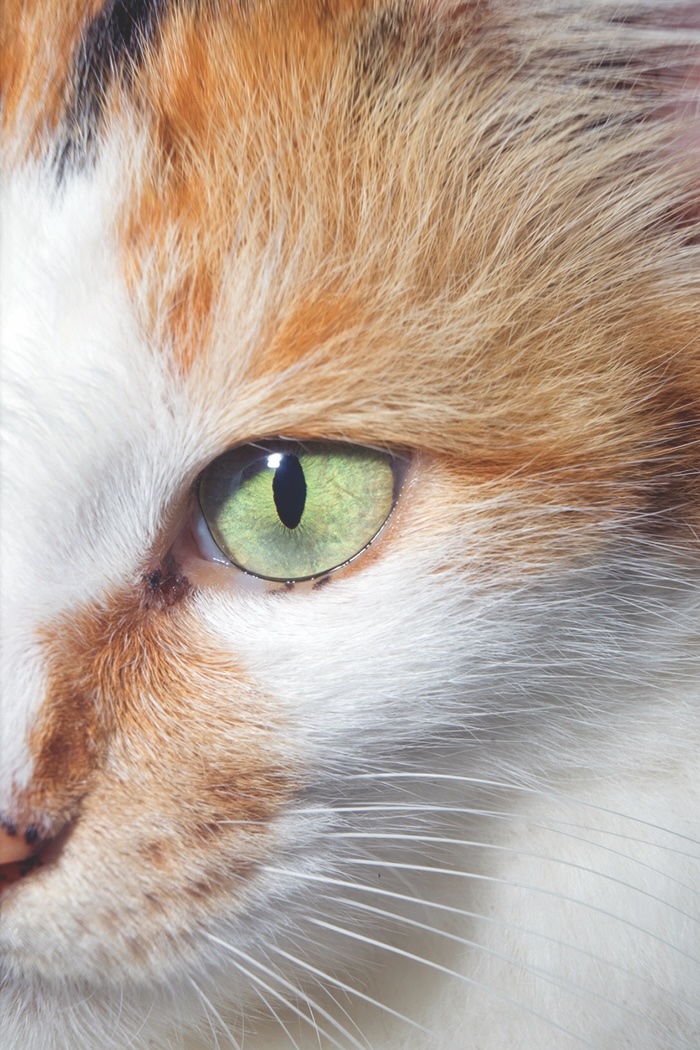Q: Our 5-month-old domestic shorthair calico has been struggling with conjunctivitis for the past few months. She has been on two courses of antibiotics, and my concern is that we are presuming that this is due to herpes virus and not considering other causes. Are there other possible causes of conjunctivitis?
A: Thanks for getting in touch, and I understand your concern about your kitty’s condition. While it is most important, of course, to continue to work with your veterinary team to assure best care for her, perhaps a brief review of feline conjunctivitis in general would improve your understanding of this common feline malady.
The conjunctiva refers to the mucous membrane that lines the eyelids and the sclera (white part of the eyeball). This specialized tissue has a good blood supply and serves the functions of lubricating the eye via production of mucous and tears. It also prevents invasion of the eye by microscopic organisms through a robust local immune system.
Conjunctivitis refers to a condition in which the conjunctiva becomes inflamed. This will usually manifest as red, swollen conjunctival tissue, often with varying degrees of ocular discharge. Cats that suffer from conjunctivitis may squint or blink the affected eye, paw at their eyes, and/or show reluctance to open their eyes under bright-light conditions (called photosensitivity).
Far and away the most common cause of feline conjunctivitis is feline herpesvirus infection, as up to 95% of cats are exposed to feline herpesvirus at some point in their lives, and up to 80% of cats are carriers of this virus. Generally, herpesvirus infections are lifelong (the virus remains latent in the nervous system), and stress and/or treatment with immune-suppressing drugs (i.e., corticosteroids) can cause flare-ups of conjunctivitis in latent carriers of the virus.
Upon initial infection with feline herpesvirus, most cats will demonstrate some degree of fever, sneezing, and nasal discharge, and some may experience corneal ulceration (damage to the clear covering of the eyeball).
Other infectious agents that commonly cause conjunctivitis in cats include Chlamydia felis, a bacteria that can potentially be passed to people, and Mycoplasma and Bordetella bronchiseptica, which can cause self-limiting cases of conjunctivitis in affected cats. Calicivirus infections may also cause conjunctivitis.
Activation of the immune system by allergens and/or irritants can also cause conjunctivitis in cats, but these are less common causes of conjunctivitis in cats than the infectious agents I have mentioned above.
The presumptive diagnosis of the cause of conjunctivitis in cats is usually made via careful evaluation of the history of potential exposure of the cat to infectious agents, physical examination, and the age of the cat. This is both reasonable and practical, as while there are a variety of diagnostic tests that can be performed (i.e., microscopic evaluation of conjunctival swabs, testing for antibodies to infectious agents in the blood, culturing of conjunctival samples, and DNA-based screening for infectious agents), the incidence of false positive and negative results among these tests is not trivial.
The treatment of conjunctivitis in cats depends upon the primary cause, with antiviral medications usually being recommended for virally induced cases and antibiotics prescribed for bacterial infections. It is important to know that secondary bacterial infections after an initial viral infection of the feline conjunctiva are common.
It is important for owners to understand that none of the antiviral medications currently available to treat feline conjunctivitis completely clear the viruses that cause this condition, and affected cats will often be lifelong carriers who may experience occasional flare-ups throughout their lives.
For this reason, minimizing stress, which can cause flare-ups, is crucial in managing cats with virally induced conjunctivitis.
It is also important to note that vaccines for both feline herpesvirus and calicivirus are considered core vaccines that all cats should receive, and that making sure that your cat is appropriately vaccinated will decrease the likelihood that he/she will experience conjunctivitis.
I hope this is helpful, and best of luck with your little girl.



